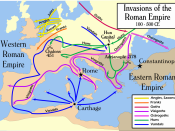Whether militaristic, economic or political motives ÃÂ there has always been an objective and goal motivating imperialism. In Macedonia, Alexander went on his conquest of the east; this is a prime example of the previous notions. Another example would be that the Romans brought Europe under one hegemonic power. This essay, will evaluate Greco-Roman civilizations, and the impact they had on the ancient and classic age. The essay will begin by providing a brief history on Greece and Rome, thus highlighting their imperialistic achievements through excerpts from the ÃÂWorld HistoryÃÂ CD-ROM and the text ÃÂThe Human VentureÃÂ written by Anthony Esler. These primary sources are significant because it helps illuminate the historical perspective of people involved in Greco-Roman imperialism. Finally, this essay will show that imperialism does not last, nations resist rule from foreign powers, and although imperialism brings prosperity, it causes inequality, thus leading to internal destruction.
ÃÂO my son, carve out a kingdom equal to and worthy of yourself, for Macedonia is too small for youÃÂ (Davis 137).
These were the words said to young Alexander by his father Philip; his words may have influenced the greatest Macedonian imperialistic hero. The following document is an excerpt from an Athenian persuasive speaker ÃÂ Demosthenes, entitled ÃÂThe Spectre of Phillip: DemosthenesÃÂ first PhillipicÃÂ, and it warns of Macedonian imperialism.
ÃÂLook at the situation, men of AthensÃÂ He [Phillip II] gives you no choice between action and living at peace, but threatensÃÂ and cannot be satisfied by his conquests, but is always seeking fresh acquisitions and trying to hedge us in on all sidesÃÂ (Ellis and Milne 134).
The major strength of this document is that it shows the perspective of a weaker nation ÃÂ Athens. The document also illustrates the importance of a nationÃÂs sovereignty. It is unlikely that...


